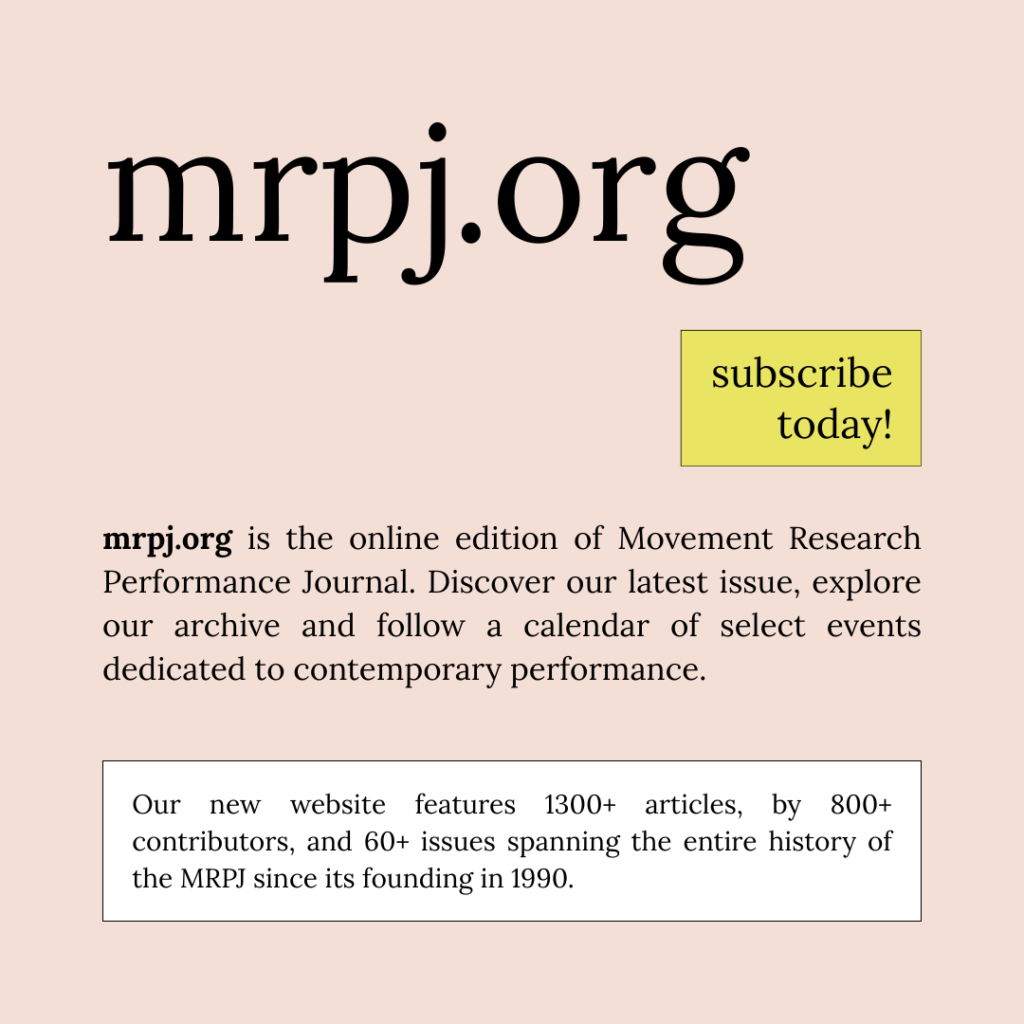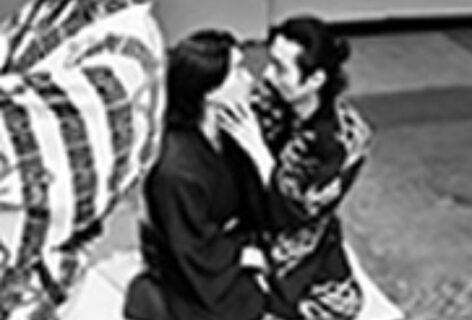FALL 1990
Editor: Richard Elovich
And speaking of artists, why is it that more dancers don’t practice the art of writing about their work? There’s a long tradition of literacy among painters, composers, etc., and I see practically nothing on dance by dancers in public places. Jill Johnston, 1965
With this first issue of Movement Research, we open a new public space for the New York performance community: a textual space in which artists can develop a critical relationship to the work being produced around us. If we want to further the forms of dance and performance, we need to be prepared to analyze and contextualize our own work, as well as the work of our predecessors and contemporaries. American dance has brought itself to a heightened kinetic intelligence, but we have had much more difficulty articulating our relationship to philosophic and social concerns. Recognizing a real lack of opportunity for choreographers, dancers, writers, musicians, and performers to engage in each others’ work analytically, we have created Movement Research as a slightly anarchic forum in which opposing ideas and aesthetics can be seriously developed and debated.
In an attempt to provide a historical context for writing on performance, we have reprinted past articles by Richard Schechner and Jill Johnston. At the same time, we want this space to be available to writers of varying experience. This forum gives us an opportunity to grapple, perhaps clumsily at first, with the practice of writing about dance and performance. In a time when the arts and artists are seriously under attack, a dialogue among artists develops both the rigorous introspection and the larger commitment of community, creating a vision necessary for survival.
This first issue of Movement Research is the product of a lot of volunteer effort and time. Obviously, we need money to continue. Checks are welcome, and ideas for sources of support are particularly helpful. All contributions are appreciated and are tax-deductible to the full extent allowed by law. People who are not in a position to make direct financial contributions are invited to donate their time – we need all sorts of volunteers.
As you can see from the pull-out calendars, we are continuing to expand our schedule of workshops and performances. For those who have been with us and those who are joining us, here is a rundown of what we have been doing, where our commitments lie and where we are headed.
The 22 workshops this fall and winter feature choreographers, performers, and directors representing a wide range of new and experimental work. Through these workshops, artists learn from other artists, while dances and dance ensembles are created. Workshops by Simone Forti and Lisa Nelson will lead to performances by the participants. Workshops with Steve Paxton, Eiko & Koma, Dana Reitz, Susan Klein, Yvonne Meier, Bill Irwin, and Danny Lepkoff, among others give students direct access to the primary source of a creative technique.
With funding from the New York State Council on the Arts, we are entering the second year of our Residency Project, supporting the work of Arthur Aviles, Simone Forti, Yvonne Meier, Jennifer Monson, David Zambrano, Nelson Zayas, and the Improv Collective (John Jasperse, Clarinda MacLow, Jennifer Lacey, Conor McTeague, and DD Dorvillier). The Residency provides rehearsal subsidies, work-in-progress performances, teaching opportunities and commissioning funds for the creation of new work.
In the last year, we have doubled our Presenting Series weekends, found funding for musicians performing live in collaboration with choreographers, and have lowered our ticket price to $5 to make these performance events more accessible.
Movement Research, Inc. is an artist-run organization committed to the exploration of new ideas in dance and performance. By presenting the artist as primary resource (instructor, panelist, writer, curator, typist), we support a comprehensive approach to dance and performance.
Richard Elovich, 1991
Back Page quote:
“The salvation of this human world lies nowhere else than in the human heart, in the human power to reflect, in human meekness and in human responsibility… We are still incapable of understanding that the only genuine backbone of all our actions – if they are to be moral – is responsibility. Responsibility to something higher than my family, my country, my firm, my success.” He added that that was why he had “ultimately decided – after resisting for a long time – to accept the burden of political responsibility.” Vaclav Havel addressing the United States Congress last February.





